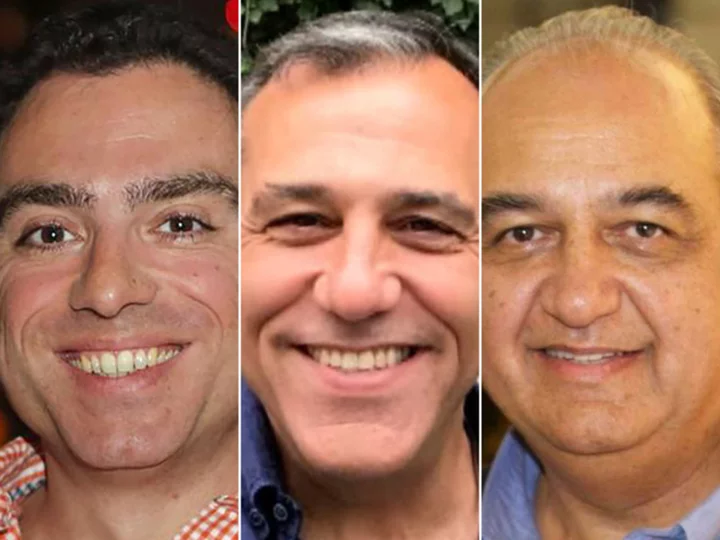Closing in on a deal to free five Americans detained in Iran, US and Iranian delegations gathered in separate hotels in Doha -- within sight of each other, but not within earshot -- as Qatari diplomats shuttled back and forth trying feverishly to broker an elusive agreement between the two.
None of the conversation played out in face-to-face meetings between the US and Iran over more than a year of on-and-off hotel meetings in the Qatari capital, a US official familiar with the negotiations told CNN.
Instead, Qatari officials relayed messages back and forth, with some of the logistical work happening in the most discreet way possible, according to a US official familiar with the negotiations -- via text thread between the Qataris and the US diplomats.
The indirect talks were part of a two-year process that brought about the deal announced this week, a potential diplomatic breakthrough between bitter adversaries who don't even talk to each other.
The overall contours of the deal's roadmap began to crystallize in Doha about six months ago, after two-and-a-half years of intensive on-and-off indirect discussions between Washington and Tehran. And on Thursday, those intense efforts yielded the first sign of payoff, when Iran released four Americans who had been detained in the notorious Evin Prison and moved them into house arrest.
"It's a positive step that they were released from prison and sent to home detention. But this is just the beginning of a process that I hope and expect will lead to their return home to the United States," Secretary of State Antony Blinken said after the transfer was announced.
If that plays out as agreed, the intricate diplomacy will have produced a momentous agreement between long-time adversaries whose relationship has been strained by Iran's growing nuclear program and its alleged human rights abuses.
Befitting the relationship, the path has been thorny, according to accounts shared with CNN by several sources familiar with the talks. The United States and Iran don't have diplomatic relations, and public overtures by Washington to engage directly with Tehran on the matter were rebuffed.
Instead, the US had to pursue indirect avenues, relying on partners in the Middle East and Europe including Qatar, Oman, the United Kingdom and Switzerland, all of whom served as interlocutors for the two sides over the course of the past two and a half years.
US officials approached the negotiations with the understanding that there were "no guarantees" with the Iranians, according to a source familiar with the negotiations. But as things seemed to fall into place, the US government began reaching out to Congress and to family members.
It was not until a couple of days before the transfer to house arrest that the American side realized the plan was going into motion. A fifth American was already under house arrest.
On Wednesday, the US had "what (appeared) to be concrete information" that the first step in the deal -- moving the four Americans out of Evin Prison and into house arrest -- would be taken on Thursday, the source familiar with the negotiations said.
Still, officials were wary.
"There are certainly elements of the Iranian system that do not want this to happen," the source warned.
When Thursday came, US officials had a direct line to the Swiss Ambassador in Iran for updates as to progress on the ground, the US official said. Swiss diplomats serve as the protecting power -- the eyes and ears on the ground -- for the US in Iran.
Early in the afternoon Thursday Washington time, National Security Council Spokesperson Adrienne Watson announced the White House had "received confirmation that Iran has released from prison five Americans who were unjustly detained and has placed them on house arrest."
The path forward now has been described as a step-by-step process, and American officials stress that the indirect negotiations are ongoing and sensitive.
One component of the deal is an expected prisoner swap between the US and Iran, and another involves making $6 billion in Iranian funds that have been in a restricted account in South Korea more readily available for "non-sanctionable trade" of goods like food and medicine by moving them to restricted accounts in Qatar. Sources tell CNN the funds came from oil sales that were allowed and placed into accounts set up under the Trump administration.
One source briefed on the agreement said the process to transfer the funds to Qatar is likely to take 30 to 45 days, and two sources said the money would go through Switzerland before getting to Qatar.
The implementation won't be easy. The US Treasury will be heavily involved, as the transfer of Iranian funds to Qatar is expected to take weeks to complete particularly because the US is not lifting any sanctions in order to facilitate the transfer, sources said.
The indirect negotiations involved officials from across the Biden administration, including the State Department and the White House, and they closely involved the US Treasury Department, the official said. Treasury's involvement made the process more arduous at times, but was necessary to be sure that any agreement would maintain strict oversight of the Iranian funds, the official added.
The process to get to this point -- with the end goal of securing the Americans' release -- has been a long road for Biden administration officials. Sources said that bringing the Americans back home had been a priority from the outset of President Joe Biden's tenure.
The three Americans publicly known to be in the deal -- Siamak Namazi, Morad Tahbaz and Emad Shargi -- had been imprisoned for years before Biden took office, with Namazi being arrested when Biden was vice president and left behind in a deal secured under the Obama administration.
Now, US officials say the work continues, but they are cautiously optimistic that the five could be coming home.
"My belief is that this is the beginning of the end of their nightmare and the nightmare that their families have experienced," Blinken said.

